#include <RIFFParser.h>

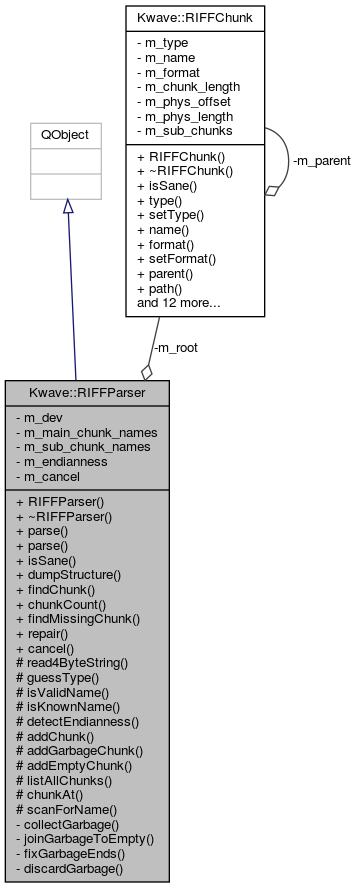
Public Slots | |
| void | cancel () |
Signals | |
| void | action (const QString &name) |
| void | progress (int percent) |
Public Member Functions | |
| RIFFParser (QIODevice &device, const QStringList &main_chunks, const QStringList &known_subchunks) | |
| virtual | ~RIFFParser () |
| bool | parse () |
| bool | parse (Kwave::RIFFChunk *parent, quint32 offset, quint32 length) |
| bool | isSane () |
| void | dumpStructure () |
| Kwave::RIFFChunk * | findChunk (const QByteArray &path) |
| unsigned int | chunkCount (const QByteArray &path) |
| Kwave::RIFFChunk * | findMissingChunk (const QByteArray &name) |
| void | repair () |
Protected Member Functions | |
| QByteArray | read4ByteString (qint64 offset) |
| Kwave::RIFFChunk::ChunkType | guessType (const QByteArray &name) |
| bool | isValidName (const char *name) |
| bool | isKnownName (const QByteArray &name) |
| void | detectEndianness () |
| Kwave::RIFFChunk * | addChunk (Kwave::RIFFChunk *parent, const QByteArray &name, const QByteArray &format, quint32 length, quint32 phys_offset, quint32 phys_length, Kwave::RIFFChunk::ChunkType type) |
| bool | addGarbageChunk (Kwave::RIFFChunk *parent, quint32 offset, quint32 length) |
| bool | addEmptyChunk (Kwave::RIFFChunk *parent, const QByteArray &name, quint32 offset) |
| void | listAllChunks (Kwave::RIFFChunk &parent, Kwave::RIFFChunkList &list) |
| Kwave::RIFFChunk * | chunkAt (quint32 offset) |
| QList< quint32 > | scanForName (const QByteArray &name, quint32 offset, quint32 length, int progress_start=0, int progress_count=1) |
Private Member Functions | |
| void | collectGarbage () |
| bool | joinGarbageToEmpty () |
| void | fixGarbageEnds () |
| void | discardGarbage (Kwave::RIFFChunk &chunk) |
Private Attributes | |
| QIODevice & | m_dev |
| Kwave::RIFFChunk | m_root |
| QStringList | m_main_chunk_names |
| QStringList | m_sub_chunk_names |
| Kwave::byte_order_t | m_endianness |
| bool | m_cancel |
Detailed Description
Definition at line 38 of file RIFFParser.h.
Constructor & Destructor Documentation
◆ RIFFParser()
| Kwave::RIFFParser::RIFFParser | ( | QIODevice & | device, |
| const QStringList & | main_chunks, | ||
| const QStringList & | known_subchunks | ||
| ) |
Constructor.
- Parameters
-
device QIODevice to parse through. main_chunks list of known names of main chunks known_subchunks list of known subchunks
Definition at line 58 of file RIFFParser.cpp.
References m_root, Kwave::RIFFChunk::Root, and Kwave::RIFFChunk::setType().

◆ ~RIFFParser()
|
virtual |
Member Function Documentation
◆ action
|
signal |
emits the name of the currently performed action
Referenced by detectEndianness(), and findMissingChunk().

◆ addChunk()
|
protected |
Creates and adds a new chunk. Will be parented to the first non-garbage chunk.
- Parameters
-
parent pointer to the parent node (or null if root node) name the 4-byte name of the chunk format the 4-byte format specifier, only valid for main chunks, contains invalid data in sub-chunks length size of the chunk's data phys_offset start of the chunk name in the source phys_length length allocated in the source (file) type chunk type,
- See also
- RIFFChunk::ChunkType
- Returns
- pointer to the new created chunk
Definition at line 235 of file RIFFParser.cpp.
References Kwave::RIFFChunk::Garbage, m_root, Kwave::RIFFChunk::parent(), Kwave::RIFFChunk::physStart(), Kwave::RIFFChunk::setType(), Kwave::RIFFChunk::subChunks(), and Kwave::RIFFChunk::type().
Referenced by addEmptyChunk(), addGarbageChunk(), and parse().
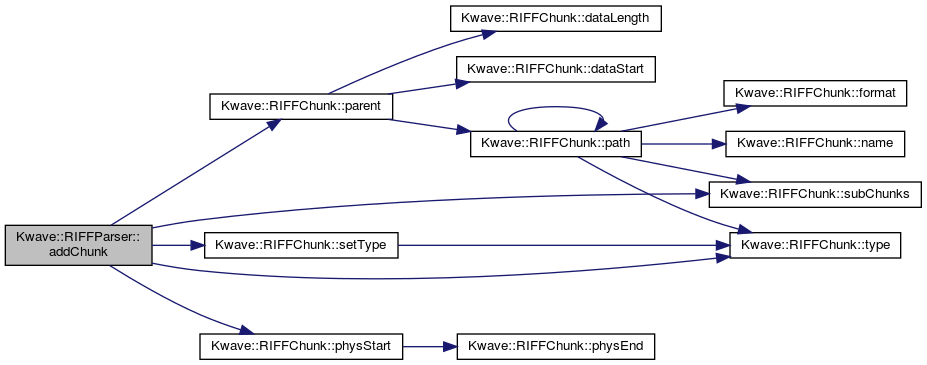

◆ addEmptyChunk()
|
protected |
Adds a chunk with a valid name and no length information.
- Parameters
-
parent pointer to the parent node name the valid name of the chunk offset start of the chunk name in the source
- Returns
- true if creation succeeded, false if out of memory
Definition at line 293 of file RIFFParser.cpp.
References addChunk(), and Kwave::RIFFChunk::Empty.
Referenced by parse().


◆ addGarbageChunk()
|
protected |
Adds a chunk that has no valid name and thus is not recognized. It is assumed that it only contains undecodeable garbage without any valid name, length or other header information.
- Parameters
-
parent pointer to the parent node offset start of the chunk name in the source length length of the garbage area in bytes
- Returns
- true if creation succeeded, false if out of memory
Definition at line 278 of file RIFFParser.cpp.
References addChunk(), Kwave::RIFFChunk::Garbage, and name.
Referenced by parse().


◆ cancel
|
slot |
◆ chunkAt()
|
protected |
Returns a pointer to a chunk that starts at a given offset or zero if none found.
- Parameters
-
offset the start position (physical start)
- Returns
- pointer to the chunk or zero
Definition at line 534 of file RIFFParser.cpp.
References listAllChunks(), m_root, and Kwave::RIFFChunk::physStart().
Referenced by parse().


◆ chunkCount()
| unsigned int Kwave::RIFFParser::chunkCount | ( | const QByteArray & | path | ) |
Returns the number of times a chunk is present
Definition at line 463 of file RIFFParser.cpp.
References listAllChunks(), m_root, Kwave::RIFFChunk::name(), and Kwave::RIFFChunk::path().
Referenced by Kwave::WavDecoder::open().
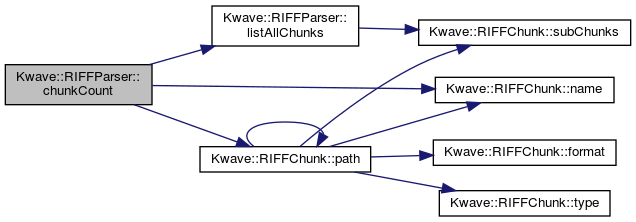

◆ collectGarbage()
|
private |
clear all main chunks that contain only garbage and convert them into garbage chunks
Definition at line 632 of file RIFFParser.cpp.
References Kwave::RIFFChunk::Garbage, listAllChunks(), m_cancel, m_root, Kwave::RIFFChunk::physEnd(), Kwave::RIFFChunk::physStart(), Kwave::RIFFChunk::setLength(), Kwave::RIFFChunk::setType(), Kwave::RIFFChunk::subChunks(), and Kwave::RIFFChunk::type().
Referenced by repair().
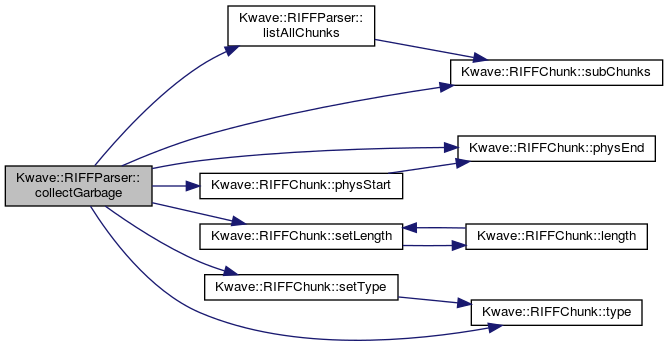

◆ detectEndianness()
|
protected |
Tries to detect the endianness of the source. If successful, the endianness will be set. If failed, will be set to "Unknown".
Definition at line 107 of file RIFFParser.cpp.
References _, action(), Kwave::BigEndian, Kwave::LittleEndian, m_cancel, m_dev, m_endianness, m_main_chunk_names, m_root, m_sub_chunk_names, name, Kwave::RIFFChunk::physLength(), Kwave::RIFFChunk::physStart(), progress(), read4ByteString(), scanForName(), and Kwave::UnknownEndian.
Referenced by parse().


◆ discardGarbage()
|
private |
Discards all garbage sub-chunks
Definition at line 796 of file RIFFParser.cpp.
References Kwave::RIFFChunk::Garbage, m_cancel, Kwave::RIFFChunk::subChunks(), and Kwave::RIFFChunk::type().
Referenced by repair().


◆ dumpStructure()
| void Kwave::RIFFParser::dumpStructure | ( | ) |
Dumps the structure of all chunks, useful for debugging.
Definition at line 431 of file RIFFParser.cpp.
References Kwave::RIFFChunk::dumpStructure(), and m_root.
Referenced by Kwave::WavDecoder::open().


◆ findChunk()
| Kwave::RIFFChunk * Kwave::RIFFParser::findChunk | ( | const QByteArray & | path | ) |
Tries to find a chunk in the tree of parsed chunks, only accepting a full match.
- Parameters
-
path the full path of the chunk to be searched
- Returns
- the found chunk or zero if nothing found
Definition at line 443 of file RIFFParser.cpp.
References listAllChunks(), m_root, Kwave::RIFFChunk::name(), and Kwave::RIFFChunk::path().
Referenced by Kwave::WavDecoder::open().
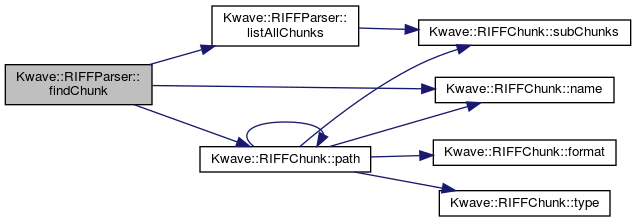

◆ findMissingChunk()
| Kwave::RIFFChunk * Kwave::RIFFParser::findMissingChunk | ( | const QByteArray & | name | ) |
Tries very hard to find a missing chunk by stepping through the whole file or source.
- Parameters
-
name the 4-byte name of the chunk
- Returns
- the found chunk or zero if nothing found
Definition at line 544 of file RIFFParser.cpp.
References action(), Kwave::RIFFChunk::Garbage, listAllChunks(), m_cancel, m_root, parse(), Kwave::RIFFChunk::physEnd(), Kwave::RIFFChunk::physLength(), Kwave::RIFFChunk::physStart(), progress(), scanForName(), and Kwave::RIFFChunk::type().
Referenced by Kwave::WavDecoder::open().
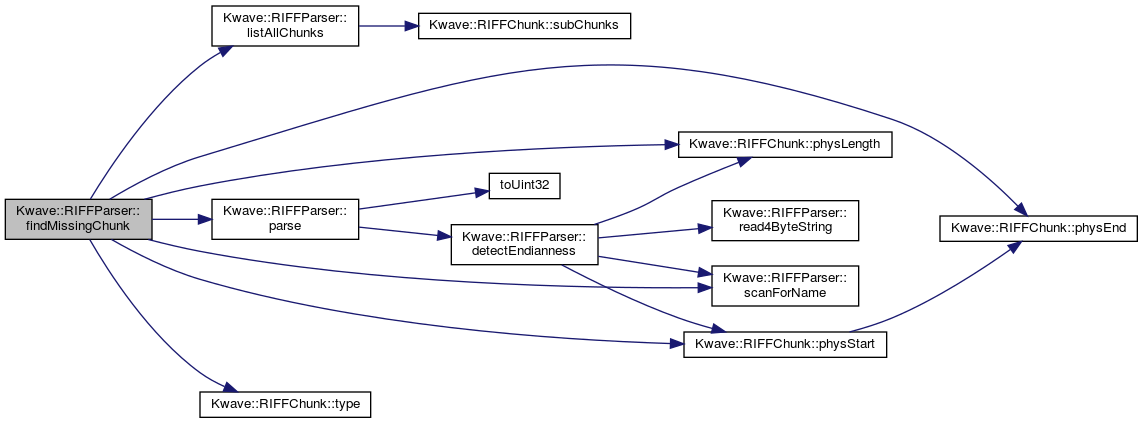

◆ fixGarbageEnds()
|
private |
fixes the end of garbage chunks to no longer overlap valid chunks
Definition at line 682 of file RIFFParser.cpp.
References Kwave::RIFFChunk::Garbage, Kwave::RIFFChunk::isChildOf(), listAllChunks(), m_cancel, m_root, Kwave::RIFFChunk::name(), Kwave::RIFFChunk::physEnd(), Kwave::RIFFChunk::physStart(), Kwave::RIFFChunk::setLength(), and Kwave::RIFFChunk::type().
Referenced by repair().
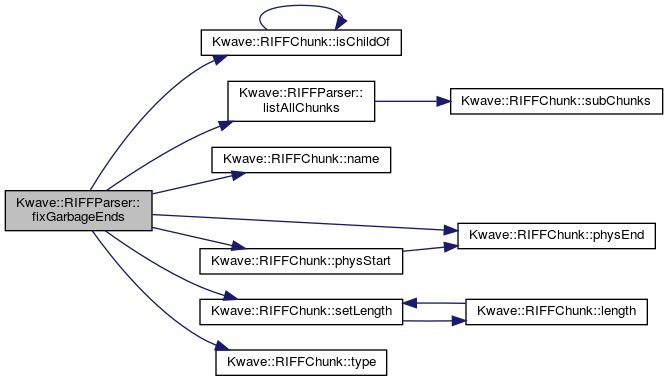

◆ guessType()
|
protected |
Tries to find the chunk name in the list of known main chunk names and returns RIFFChunk::Main if successful. Otherwise returns RIFFChunk::Sub or RIFFChunk::Garbage if the chunk name is not valid.
- Parameters
-
name the name of the chunk
- Returns
- RIFFChunk::Main or RIFFChunk::Sub or RIFFChunk::Garbage
Definition at line 91 of file RIFFParser.cpp.
References Kwave::RIFFChunk::Garbage, isValidName(), m_main_chunk_names, Kwave::RIFFChunk::Main, and Kwave::RIFFChunk::Sub.
Referenced by joinGarbageToEmpty(), and parse().


◆ isKnownName()
|
protected |
Returns true if the given chunk name is known as main or sub chunk
Definition at line 99 of file RIFFParser.cpp.
References m_main_chunk_names, and m_sub_chunk_names.
Referenced by joinGarbageToEmpty().

◆ isSane()
| bool Kwave::RIFFParser::isSane | ( | ) |
Returns true if the source contains no structural errors and no garbage or empty chunks.
Definition at line 437 of file RIFFParser.cpp.
References Kwave::RIFFChunk::isSane(), and m_root.
Referenced by Kwave::WavDecoder::open().


◆ isValidName()
|
protected |
Returns true if the given chunk name is valid
Definition at line 76 of file RIFFParser.cpp.
Referenced by guessType(), and parse().

◆ joinGarbageToEmpty()
|
private |
joins garbage to previous empty chunks. If a chunk follows a previously empty chunk with an unknown name it will be joined too.
- Returns
- true if it needs an additional pass
Definition at line 731 of file RIFFParser.cpp.
References Kwave::RIFFChunk::dataLength(), Kwave::RIFFChunk::dataStart(), Kwave::RIFFChunk::Empty, Kwave::RIFFChunk::Garbage, guessType(), isKnownName(), listAllChunks(), m_cancel, m_root, Kwave::RIFFChunk::Main, Kwave::RIFFChunk::name(), Kwave::RIFFChunk::parent(), parse(), Kwave::RIFFChunk::physLength(), Kwave::RIFFChunk::physStart(), read4ByteString(), Kwave::RIFFChunk::setFormat(), Kwave::RIFFChunk::setLength(), Kwave::RIFFChunk::setType(), Kwave::RIFFChunk::subChunks(), and Kwave::RIFFChunk::type().
Referenced by repair().
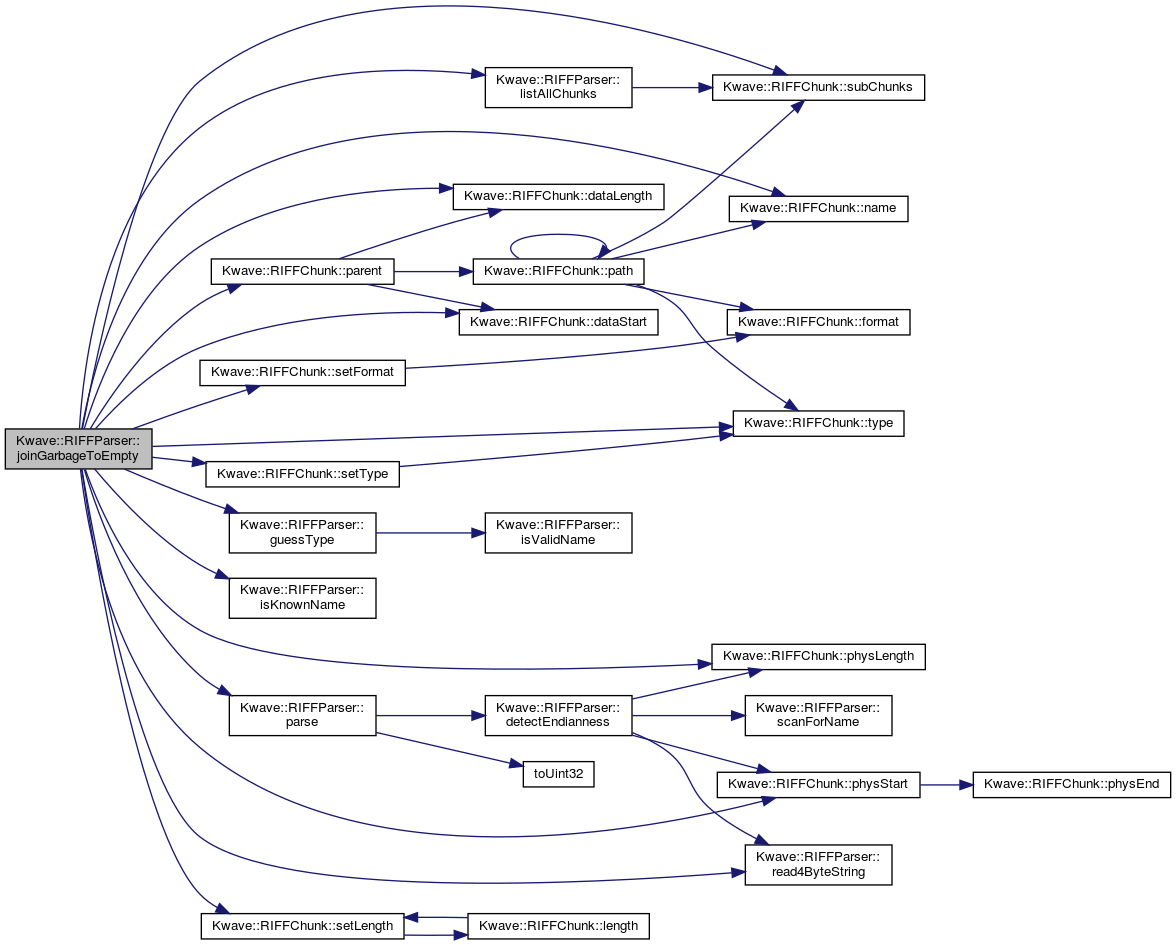

◆ listAllChunks()
|
protected |
Recursively creates a "flat" list of all chunks.
- Parameters
-
parent node to start with list receives references to the chunks
Definition at line 525 of file RIFFParser.cpp.
References Kwave::RIFFChunk::subChunks().
Referenced by chunkAt(), chunkCount(), collectGarbage(), findChunk(), findMissingChunk(), fixGarbageEnds(), and joinGarbageToEmpty().

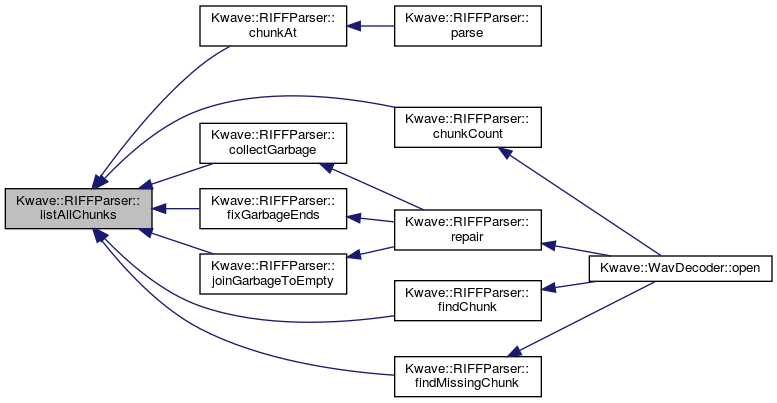
◆ parse() [1/2]
| bool Kwave::RIFFParser::parse | ( | ) |
Parses the whole source.
- Returns
- true if passed without any error
Definition at line 219 of file RIFFParser.cpp.
References detectEndianness(), m_dev, m_endianness, m_root, toUint32(), and Kwave::UnknownEndian.
Referenced by findMissingChunk(), joinGarbageToEmpty(), Kwave::WavDecoder::open(), and parse().


◆ parse() [2/2]
| bool Kwave::RIFFParser::parse | ( | Kwave::RIFFChunk * | parent, |
| quint32 | offset, | ||
| quint32 | length | ||
| ) |
Parses a range of the source and adds all found chunks to a list of chunks. Also parses recursively for sub-chunks and builds a tree.
- Parameters
-
parent pointer to the parent node offset start of the chunk name in the source length size of the area where to search
- Returns
- true if passed without any error
Definition at line 304 of file RIFFParser.cpp.
References addChunk(), addEmptyChunk(), addGarbageChunk(), chunkAt(), Kwave::RIFFChunk::dataLength(), Kwave::RIFFChunk::dataStart(), guessType(), isValidName(), m_cancel, m_dev, m_endianness, m_root, Kwave::RIFFChunk::Main, Kwave::RIFFChunk::name(), name, parse(), Kwave::RIFFChunk::path(), Kwave::RIFFChunk::physEnd(), Kwave::RIFFChunk::physLength(), read4ByteString(), Kwave::RIFFChunk::setType(), Kwave::RIFFChunk::Sub, Kwave::RIFFChunk::subChunks(), and SYSTEM_ENDIANNES.
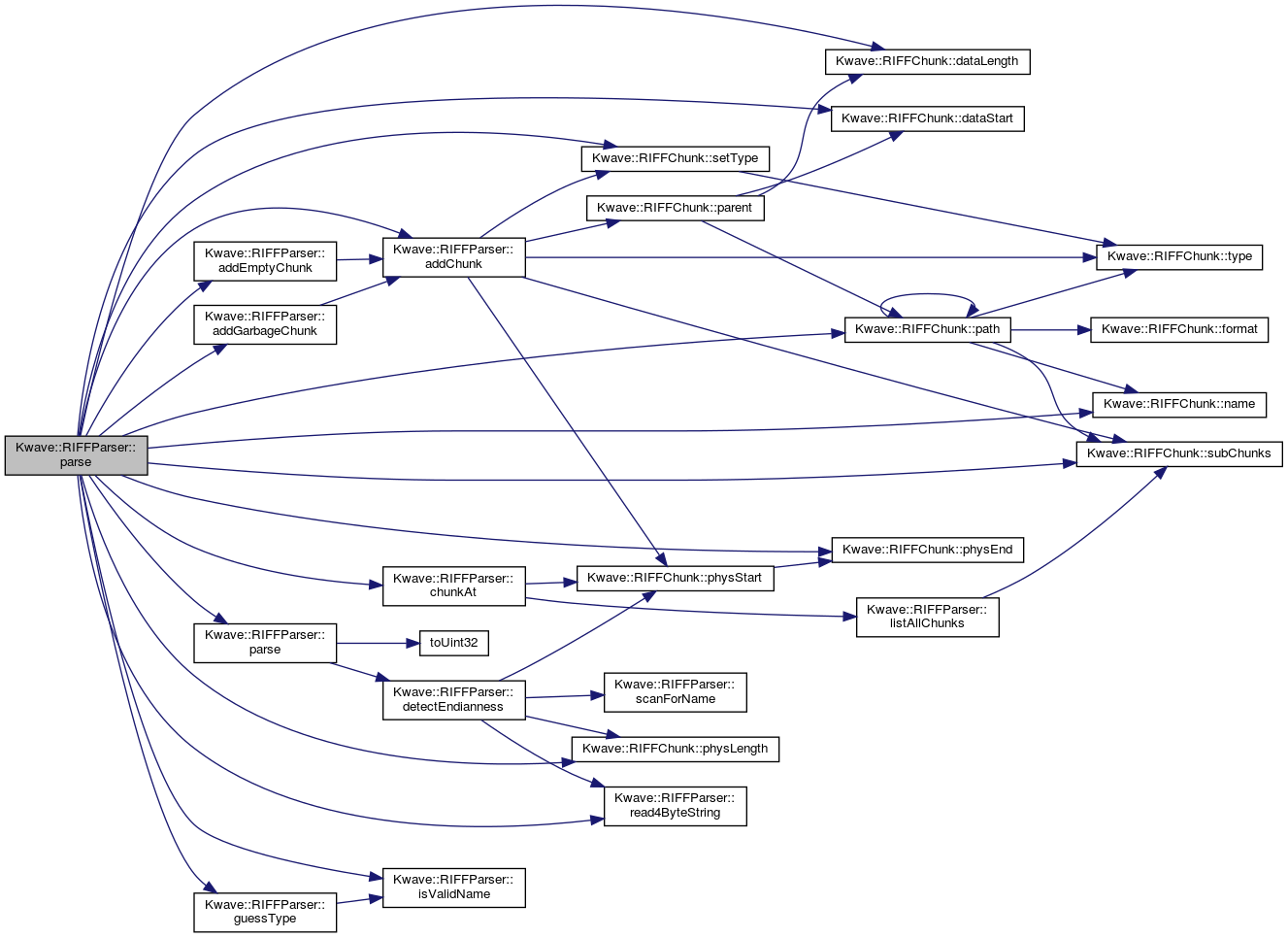
◆ progress
|
signal |
emits a progress in percent
Referenced by detectEndianness(), findMissingChunk(), and scanForName().

◆ read4ByteString()
|
protected |
Reads a 4-byte string from the source device at a given offset. The current source position will be set to 4 bytes after the given offset afterwards.
- Parameters
-
offset position within the source, no range checks!
- Returns
- string with 4 bytes
Definition at line 208 of file RIFFParser.cpp.
References m_dev.
Referenced by detectEndianness(), joinGarbageToEmpty(), and parse().

◆ repair()
| void Kwave::RIFFParser::repair | ( | ) |
Tries to repair the RIFF file by solving inconsistencies
Definition at line 603 of file RIFFParser.cpp.
References collectGarbage(), discardGarbage(), fixGarbageEnds(), joinGarbageToEmpty(), m_cancel, and m_root.
Referenced by Kwave::WavDecoder::open().
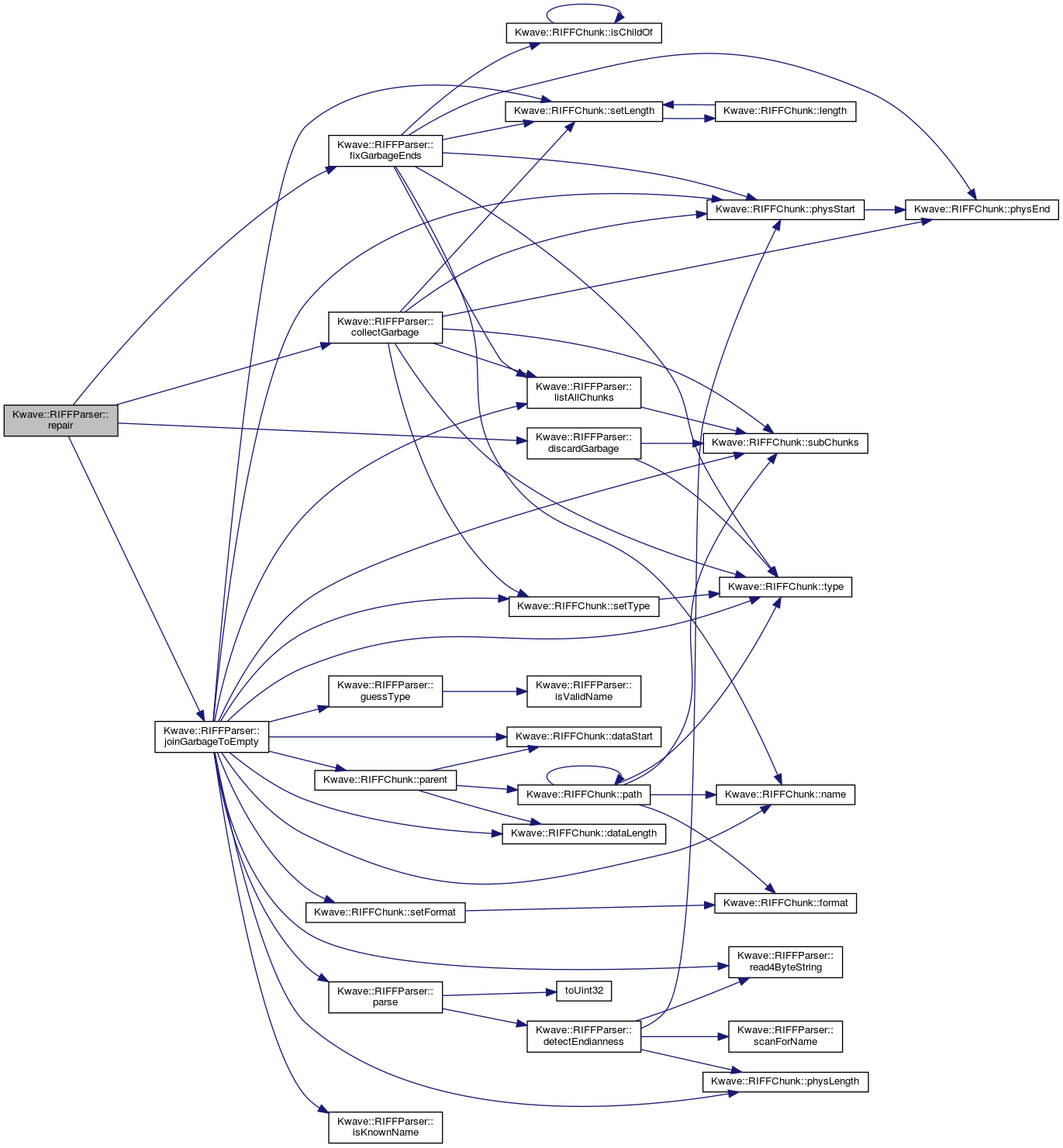

◆ scanForName()
|
protected |
Performs a scan for a 4-character chunk name over a range of the source. Also emits progress bar info from [(start/count) ... ((start+1)/count-1)]
- Parameters
-
name the name of the chunk to be found offset position for start of the scan length number of bytes to scan progress_start start of the progress [0..progress_count-1] progress_count number of progress sections
- Returns
- list of positions of where the name exists
Definition at line 484 of file RIFFParser.cpp.
References m_cancel, m_dev, and progress().
Referenced by detectEndianness(), and findMissingChunk().

Member Data Documentation
◆ m_cancel
|
private |
can be set to true in order to cancel a running operation
Definition at line 271 of file RIFFParser.h.
Referenced by cancel(), collectGarbage(), detectEndianness(), discardGarbage(), findMissingChunk(), fixGarbageEnds(), joinGarbageToEmpty(), parse(), repair(), and scanForName().
◆ m_dev
|
private |
I/O device with the source of the file
Definition at line 256 of file RIFFParser.h.
Referenced by detectEndianness(), parse(), read4ByteString(), and scanForName().
◆ m_endianness
|
private |
endianness of the RIFF file, auto-detected
Definition at line 268 of file RIFFParser.h.
Referenced by detectEndianness(), and parse().
◆ m_main_chunk_names
|
private |
list of known names of main chunks
Definition at line 262 of file RIFFParser.h.
Referenced by detectEndianness(), guessType(), and isKnownName().
◆ m_root
|
private |
root chunk of the source
Definition at line 259 of file RIFFParser.h.
Referenced by addChunk(), chunkAt(), chunkCount(), collectGarbage(), detectEndianness(), dumpStructure(), findChunk(), findMissingChunk(), fixGarbageEnds(), isSane(), joinGarbageToEmpty(), parse(), repair(), and RIFFParser().
◆ m_sub_chunk_names
|
private |
list of known names of sub chunks
Definition at line 265 of file RIFFParser.h.
Referenced by detectEndianness(), and isKnownName().
The documentation for this class was generated from the following files:
- plugins/codec_wav/RIFFParser.h
- plugins/codec_wav/RIFFParser.cpp
